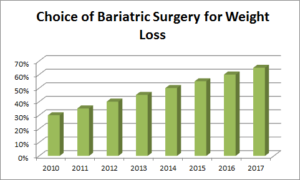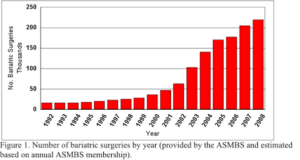
Bariatric Surgery (also known as weight loss surgery) is the surgical process of reducing belly fat, or adipose tissue, to help individuals with obesity reach a healthy weight. It generally entails one of three different types of operations: gastric bypass, sleeve gastrectomy, and adjustable gastric banding.
The procedure helps to reduce hunger and control portion size, as well as decrease the absorption of calories from food. The ultimate goal is to provide effective weight loss that leads to improved health outcomes over time. It is important to note that bariatric surgery is not a quick fix and requires dedication to achieving long-term lifestyle changes for the results to be successful.


Types of Bariatric Surgery
There are three main types of bariatric surgery available: gastric sleeve, gastric bypass, and lap band surgery.
Gastric sleeve surgery involves reducing the size of the stomach, limiting how much food can be consumed, and restricting the consumption of unhealthy foods. It is typically recommended for people with a Body Mass Index (BMI) of 40 or more, or individuals who have not found success using other methods to manage their obesity. The potential risks associated with this type of surgery include abdominal pain and infection.
Gastric bypass surgery is one of the most common types of bariatric surgery as it helps to promote weight loss by reducing both hunger and absorption of calories. By connecting the stomach to part of the small intestine, food will travel directly into this section instead of experiencing full digestion in the stomach.
It is generally suggested for people with a BMI over 50 or those who have had severe complications from obesity-related conditions. Potential side effects include nausea and vomiting, hair loss, and vitamin deficiencies.
Endoscopy Gastric Balloon involves the insertion of a deflated balloon into the stomach through the mouth using an endoscope, a flexible tube with a camera attached.
Once the gastric balloon is in place, it is then filled with a saline solution which reduces the available stomach volume for food, ultimately leading to weight loss. This procedure is typically recommended for people who are struggling to lose weight through diet and exercise alone.
The Endoscopy Gastric Balloon is a non-surgical, minimally invasive solution for weight loss. It allows for a relatively quick recovery time and encourages good eating habits since the reduced stomach volume makes overeating uncomfortable. The gastric balloon is typically removed after six months to a year, but it may be removed earlier or left in place longer depending on the individual’s progress.
Although this procedure has been proven to be effective for weight loss, patients need to maintain a healthy lifestyle with regular exercise and proper nutrition after the balloon is removed to avoid regaining the weight lost during the procedure.
As with any medical procedure, there are potential risks involved, so it is important to have a thorough consultation with a qualified healthcare provider to determine if Endoscopy Gastric Balloon is the right solution for an individual’s weight loss needs.
Mini gastric bypass is a type of weight loss surgery that combines both restrictive and malabsorptive techniques to achieve weight loss. In this procedure, the surgeon creates a small pouch in the stomach by dividing and rerouting the small intestine to connect to the pouch.
The small pouch restricts the amount of food that can be consumed, while the rerouted small intestine decreases the absorption of calories, resulting in effective weight loss.
Compared to traditional gastric bypass, mini gastric bypass is less invasive, with shorter operating time and recovery period. It also has lower rates of serious complications, though complications such as dumping syndrome, gallstones, and nutrient deficiencies may still occur.
As with any weight loss Balloon Treatment, a mini gastric bypass is a tool that can help patients lose weight and improve their health, but it is not a cure-all. Patients need to make significant lifestyle changes following the surgery, including adopting a healthy diet and engaging in regular exercise to achieve long-term weight loss success.
It is important to consult with a qualified bariatric surgeon provider to determine if a mini gastric bypass is the right option for an individual’s weight loss needs and to undergo a thorough evaluation to assess risks and potential complications.
Procedure
Before the surgery, it is important to speak with a doctor and nutritionist in order to ensure that the procedure is right for you. Depending on the type of surgery you receive, there may be other steps such as testing for any underlying health conditions or making changes to your diet.
The day of the surgery will begin with arriving at the hospital and undergoing pre-op tests and checkups. During this time, anaesthesia will be administered so that the patient does not feel any pain during the procedure.
After you are in the operating room, it is expected that you will remain asleep for several hours while the surgery is being done. Depending on each individual situation, a surgeon may opt to use open or laparoscopic techniques in order to complete the procedure.
Following surgery, most patients stay in the hospital for one or two days before returning home. Once back home, it is essential to follow all post-operative care instructions given by your medical team closely.
In addition to taking prescribed medications, patients should also stick to smaller meals and healthier lifestyle behaviours such as incorporating exercise into their daily routines. Most individuals can return to work within four weeks after their procedure;
however, depending on what type of bariatric surgery they had might require more recovery time initially before attempting strenuous physical activities once again.
Make your weight loss goals a reality today.
Begin your weight loss journey today with Bariatric Surgery. Doss India Clinics Provides the Best compassionate care with the best Bariatric surgeons in Pune.
Book Your AppointmentBenefits of Bariatric Surgery
Bariatric surgery is a long-term option for those who are severely obese and unable to lose weight through traditional methods. The procedure has been found to help improve various health issues related to obesity, including type 2 diabetes, high blood pressure, and sleep apnea.
Additionally, those who have had bariatric surgery report improved energy levels, better physical activity tolerance, and increased self-esteem.

The most significant benefit of bariatric surgery is the positive impact it can have on one’s overall well-being in the long term. While there will be immediate changes from the operation itself such as reduced hunger, those who have undergone this procedure often experience greater confidence in their abilities to stick with healthier habits over time.
This includes incorporating an exercise routine into their daily lives – something that is difficult to achieve without the assistance of surgical intervention. In addition to promoting an improved lifestyle overall, bariatric surgery also helps reduce chronic medical conditions associated with obesity such as diabetes and heart disease.
If you are looking for Bariatric Surgery Treatment then you are in the right place. Doss India is the best clinic in Pune for treating Bariatric Surgery.
Risks of Bariatric Surgery
Bariatric surgery is an effective treatment for weight loss and metabolic issues, but there are some associated risks that patients should be aware of. These include:
- Anesthesia-related
- Anesthesia-related
- complications
- Risk of infection
- Bleeding or blood clots
- Gastric leakage
- Poor healing of incisions
- Development of gallstones
Bariatric surgery can also cause gastrointestinal problems such as nausea, vomiting and diarrhea. And, due to the dramatic change in diet that typically follows this type of surgery, there is a potential for nutritional deficiencies.
Patients should always weigh the risks versus benefits with their healthcare provider before undergoing any bariatric procedure.

BMI Calculator
– Overweight when BMI is from 25 to 29 kg/ square meter.
– Healthy weight when BMI is from 20 to 25
– Underweight if BMI is less than 20.
Recovery
The recovery period after bariatric surgery is typically long and requires patience. It is important to remember that the body needs time to heal properly, and that there may be some pain or discomfort during this process.
In addition, many patients experience nausea, vomiting, constipation and other physical side effects while they are recovering.
It is recommended that patients follow-up with their doctor soon after the procedure in order to monitor their progress and detect any potential complications. Follow-up visits will also help track changes in weight loss as well as changes to lifestyle habits such as exercise.
Depending on the severity of any complications experienced during recovery, additional medical treatments may be necessary.
To reduce the risk of complications during the recovery period, it is important for patients to eat a nutritious diet consisting of small meals throughout the day, drink plenty of fluids and get rest as much as possible. It can also be helpful to have a support system available throughout this time in order to provide emotional comfort and assistance if necessary.


 +919011100010
+919011100010 